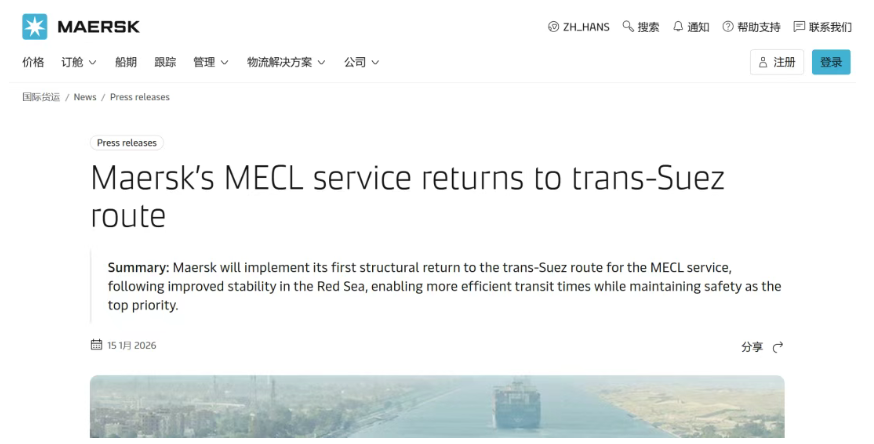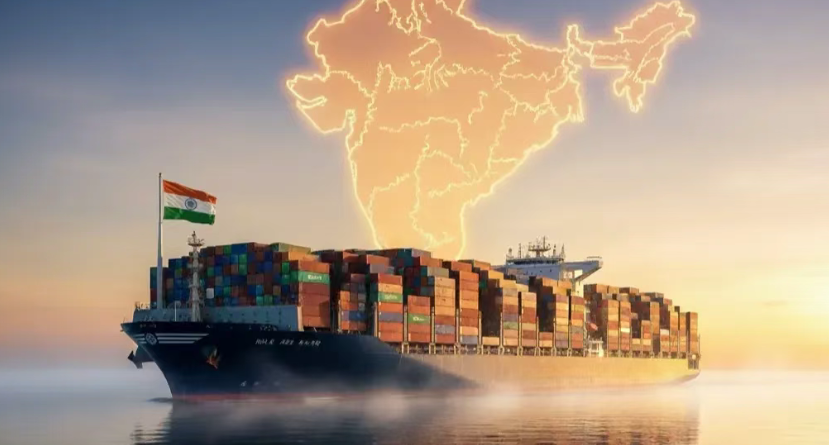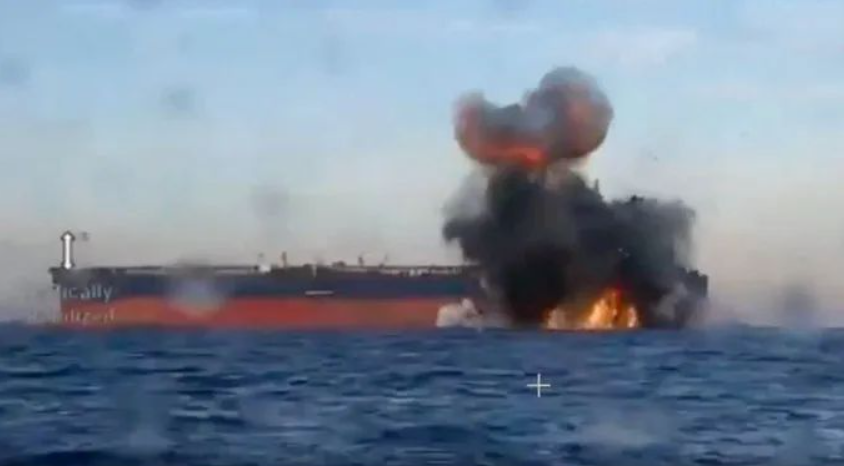In the final hours before the London vote, Washington is threatening sanctions—visa, port, contract and official measures—while the EU has responded by urging member states to back the IMO Net-Zero Framework (NZF) and "make the global framework a reality.”" The risk of geopolitics is increasingly shaping maritime regulation.
U.S. Position: Labeling NZF a "First UN-System Global Carbon Tax"
Ahead of the IMO special MEPC session on 14–17 October (MEPC/ES.2) to consider and adopt the NZF, the U.S. Government issued a joint statement on 10 October branding NZF "the first global carbon tax within the UN system" and outlining five cross-agency countermeasures against countries that support it.
The statement—signed by Secretary of State Marco Rubio, Energy Secretary Chris Wright and Transportation Secretary Sean Duffy—stresses the U.S. will not accept international arrangements seen as unfairly burdening U.S. households and industry.
The Five Countermeasures: Multi-Point Pressure from Ports to Officials
The U.S. is preparing to pressure on countries that vote for or support NZF across several levers:
Port & access: Additional U.S. port fees on ships flagged/owned/operated by supporting states; potential limits or bans on certain flag states' vessels under "anti-competitive review/potential regulation."
Visas & crew mobility: Higher C-1/D fees, more re-interviewing and quota adjustments to restrict seafarer movement.
Commercial cooperation: Constraints or penalties on newbuilds, LNG terminals and energy infrastructure tied to U.S. government contracts involving supporters.
Additional fees: Further additive port charges on supporters' ships calling the U.S.
Targeted measures on officials: Visa/financial sanctions on officials deemed to be promoting "radical climate policies."
The package also keeps "under study" tools—tariffs and added administrative fees—aimed at imposing costs on what it characterises as a "Europe-led" export of global climate rules.
Why Now: Procedural Window Meets Cost Narrative
This escalation coincides with the MEPC/ES.2 decision node on whether to adopt new NZF provisions into MARPOL Annex VI.
NZF is widely understood as a combined policy toolkit—global uniform decarbonisation trajectories plus greenhouse-gas pricing—endorsed in principle at MEPC 83. U.S. objections centre on costs: claims that NZF will raise expenses for U.S. residents, energy and maritime firms, and even tourists, potentially lifting global shipping costs by double digits—framing intended to pre-empt a "fait accompli."

Industry Divide: Call for Uniform Rules vs "Reality Check"
Mainstream industry bodies and multiple national shipowners' associations are urging delegates to "make history in London" by passing a verifiable, enforceable, globally uniform framework to avoid regulatory fragmentation and de-risk green-fuel investment.
Public supporters include ICS, ECSA, ASA, IAPH, IBIA, ITF, WSC, and shipowners’ associations in Japan, Belgium, the Netherlands, Singapore, the UK, Norway and Denmark.
At the same time, several large tanker/gas carrier groups voice "serious concerns," citing the need for more realistic alignment on trajectories, burden-sharing and competitive neutrality. U.S. threats spanning port access, visas and federal contracts heighten pre-vote tension.
Real-Time Echoes: Analyst & Practitioner Debate
Liner analyst Lars Jensen warned that, if implemented, the U.S. measures would highly disrupt U.S. supply chains.
He argues charges and access limits would ultimately translate into higher logistics costs on U.S. imports/exports—costs borne by U.S. manufacturers and consumers—while rising uncertainty makes blank sailings and service cuts more likely, lifting freight rates in the short term.
Practitioners "just reroute away from the U.S." reactions, he notes, would still compress capacity and raise prices—again flowing back to U.S. end-users. Legal and logistics voices add that effective solutions require global alignment, not penalising countries participating in multilateral schemes.
EU Response: Firm Support for NZF—and Willingness to Review EU-Only Tools
In step with Washington's pressure campaign, the European Commission (DG MOVE) declared strong support for adopting NZF at IMO and called on member states to vote in London to "make the global framework real."
Importantly, Brussels also opened a “self-review” window: if NZF passes, the EU will re-examine EU ETS and FuelEU Maritime for compatibility and alignment with the global framework—signalling "multilateral first, regional to complement," to broaden the coalition, stabilise expectations and ease concerns over rule-stacking and compliance conflicts.
Potential Knock-On Effects: Compliance, Operations, Asset Pricing
Compliance map: If NZF fails, regional carbon prices and fuel standards may proliferate, forcing companies to toggle across multiple accounting regimes and incentive/penalty structures—raising transaction costs and uncertainty.
If NZF passes, prospective U.S. unilateral countermeasures and reciprocal steps still elevate global planning risk.
Operations: Port-access limits and tighter crew visas would disturb schedules and rotations, forcing redesign of networks, berthing and crewing—near-term efficiency loss and cost uplift are likely.
Assets & contracts: LNG infrastructure, shipbuilding and long-term charters face “repricing” under shifting regulatory and geopolitical expectations—financing costs, covenants and risk premia may reset.
Key Questions: If NZF Passes with a Majority, will the U.S. actually sanction a broad set of "supporter states"? Will international services materially rebalance away from U.S. ports?
Answers hinge on NZF's final text, transition periods and guidance—and on major economies' trade-offs between "sovereign economic security" and "global uniform rules." Either way, London is set to be a watershed: toward clarity under one rulebook, or deeper fragmentation under many.
From Ambition Curve to Executable Track
The debate is not about whether to reach net zero, but how. Supporters trade uniform global rules for investment certainty and a fair playing field; opponents prioritise sovereignty and cost containment against perceived rule export.
The crucial next step is to channel this ambition into executable, verifiable, and comparable rules—creating a cohesive system that links technology, finance, and a just transition for the workforce. The alternative—a descent into a sanctions-riddled, negative-sum game—is a risk the global shipping industry can ill afford.
by Xinde Marine News Chen Yang
U.S. Position: Labeling NZF a "First UN-System Global Carbon Tax"
Ahead of the IMO special MEPC session on 14–17 October (MEPC/ES.2) to consider and adopt the NZF, the U.S. Government issued a joint statement on 10 October branding NZF "the first global carbon tax within the UN system" and outlining five cross-agency countermeasures against countries that support it.
The statement—signed by Secretary of State Marco Rubio, Energy Secretary Chris Wright and Transportation Secretary Sean Duffy—stresses the U.S. will not accept international arrangements seen as unfairly burdening U.S. households and industry.
The Five Countermeasures: Multi-Point Pressure from Ports to Officials
The U.S. is preparing to pressure on countries that vote for or support NZF across several levers:
Port & access: Additional U.S. port fees on ships flagged/owned/operated by supporting states; potential limits or bans on certain flag states' vessels under "anti-competitive review/potential regulation."
Visas & crew mobility: Higher C-1/D fees, more re-interviewing and quota adjustments to restrict seafarer movement.
Commercial cooperation: Constraints or penalties on newbuilds, LNG terminals and energy infrastructure tied to U.S. government contracts involving supporters.
Additional fees: Further additive port charges on supporters' ships calling the U.S.
Targeted measures on officials: Visa/financial sanctions on officials deemed to be promoting "radical climate policies."
The package also keeps "under study" tools—tariffs and added administrative fees—aimed at imposing costs on what it characterises as a "Europe-led" export of global climate rules.
Why Now: Procedural Window Meets Cost Narrative
This escalation coincides with the MEPC/ES.2 decision node on whether to adopt new NZF provisions into MARPOL Annex VI.
NZF is widely understood as a combined policy toolkit—global uniform decarbonisation trajectories plus greenhouse-gas pricing—endorsed in principle at MEPC 83. U.S. objections centre on costs: claims that NZF will raise expenses for U.S. residents, energy and maritime firms, and even tourists, potentially lifting global shipping costs by double digits—framing intended to pre-empt a "fait accompli."

Industry Divide: Call for Uniform Rules vs "Reality Check"
Mainstream industry bodies and multiple national shipowners' associations are urging delegates to "make history in London" by passing a verifiable, enforceable, globally uniform framework to avoid regulatory fragmentation and de-risk green-fuel investment.
Public supporters include ICS, ECSA, ASA, IAPH, IBIA, ITF, WSC, and shipowners’ associations in Japan, Belgium, the Netherlands, Singapore, the UK, Norway and Denmark.
At the same time, several large tanker/gas carrier groups voice "serious concerns," citing the need for more realistic alignment on trajectories, burden-sharing and competitive neutrality. U.S. threats spanning port access, visas and federal contracts heighten pre-vote tension.
Real-Time Echoes: Analyst & Practitioner Debate
Liner analyst Lars Jensen warned that, if implemented, the U.S. measures would highly disrupt U.S. supply chains.
He argues charges and access limits would ultimately translate into higher logistics costs on U.S. imports/exports—costs borne by U.S. manufacturers and consumers—while rising uncertainty makes blank sailings and service cuts more likely, lifting freight rates in the short term.
Practitioners "just reroute away from the U.S." reactions, he notes, would still compress capacity and raise prices—again flowing back to U.S. end-users. Legal and logistics voices add that effective solutions require global alignment, not penalising countries participating in multilateral schemes.
EU Response: Firm Support for NZF—and Willingness to Review EU-Only Tools
In step with Washington's pressure campaign, the European Commission (DG MOVE) declared strong support for adopting NZF at IMO and called on member states to vote in London to "make the global framework real."
Importantly, Brussels also opened a “self-review” window: if NZF passes, the EU will re-examine EU ETS and FuelEU Maritime for compatibility and alignment with the global framework—signalling "multilateral first, regional to complement," to broaden the coalition, stabilise expectations and ease concerns over rule-stacking and compliance conflicts.
Potential Knock-On Effects: Compliance, Operations, Asset Pricing
Compliance map: If NZF fails, regional carbon prices and fuel standards may proliferate, forcing companies to toggle across multiple accounting regimes and incentive/penalty structures—raising transaction costs and uncertainty.
If NZF passes, prospective U.S. unilateral countermeasures and reciprocal steps still elevate global planning risk.
Operations: Port-access limits and tighter crew visas would disturb schedules and rotations, forcing redesign of networks, berthing and crewing—near-term efficiency loss and cost uplift are likely.
Assets & contracts: LNG infrastructure, shipbuilding and long-term charters face “repricing” under shifting regulatory and geopolitical expectations—financing costs, covenants and risk premia may reset.
Key Questions: If NZF Passes with a Majority, will the U.S. actually sanction a broad set of "supporter states"? Will international services materially rebalance away from U.S. ports?
Answers hinge on NZF's final text, transition periods and guidance—and on major economies' trade-offs between "sovereign economic security" and "global uniform rules." Either way, London is set to be a watershed: toward clarity under one rulebook, or deeper fragmentation under many.
From Ambition Curve to Executable Track
The debate is not about whether to reach net zero, but how. Supporters trade uniform global rules for investment certainty and a fair playing field; opponents prioritise sovereignty and cost containment against perceived rule export.
The crucial next step is to channel this ambition into executable, verifiable, and comparable rules—creating a cohesive system that links technology, finance, and a just transition for the workforce. The alternative—a descent into a sanctions-riddled, negative-sum game—is a risk the global shipping industry can ill afford.
by Xinde Marine News Chen Yang
The opinions expressed herein are the author's and not necessarily those of The Xinde Marine News.
Please Contact Us at:
media@xindemarine.com






